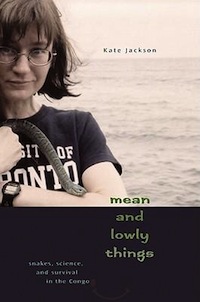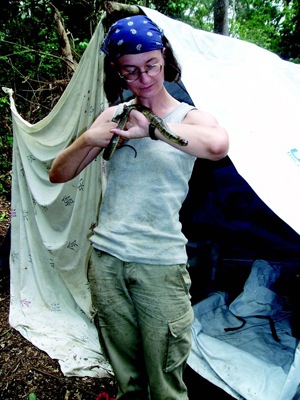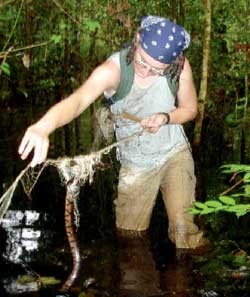
A lone mud-spattered researcher in torn khaki pants and sweat-stained sleeveless t-shirt kneels in the dirt in front of a makeshift shelter, carefully injecting formalin into a toad to halt the onset of decay. Tiny sweat bees cloud around her head, crawling into her nose and ears and getting into the corners of her eyes. She’s so concentrated on her work that she barely notices them. Suddenly, a man from the nearby Pygmy village bursts into camp.
“Madame, there is a snake in the village!”
She leaps to her feet, pausing only to stuff a snake bag into the waistband of her pants and grab a snake hook, and they run off through the forest in pursuit.
For herpetologist Kate Jackson that’s a good day of fieldwork in the Republic of Congo. This and many more dramatic stories are recounted in her book, Mean and Lowly Things. When asked why she decided to write such a deeply personal account of the challenges and tribulations of fieldwork in remote settings, she answers with typical aplomb, “Mostly to raise money for my next expedition.”
Dig deeper and you soon discover that Jackson, an assistant professor at Whitman College, passionately believes in the epigram from Aristotle that opens her book: “To understand the world, we must understand mean and lowly things.” Every page of her story breathes the excitement of discovery, and she returns again and again to the message that there is indeed great value in studying toads and snakes. “Only about two percent of all the money that is contributed to wildlife organizations goes to amphibians and reptiles,” she says. “People need to understand why they’re important.”
Jackson has been fascinated by ‘mean and lowly things’ for as long as she can remember. “As a child, I originally thought I would be a vet or a zookeeper,” she says, until, on a high-school career day, she was shown the collections of the herpetology department of the Royal Ontario Museum. “I’d never seen anything like it,” she says, her voice still coloured with wonder. “A new world opened up before me.” The experience, and subsequent undergraduate work at the Smithsonian Institution, revealed to her the importance of collecting and identifying specimens. When the bigger picture comes together, she explains, the interrelationship of all living things and the niche each species occupies in the planetary ecosystem can be understood. It is then that individual species can be protected and balance maintained.
For someone always interested in exploration, a longing to study the real thing in the wild was inevitable. In 1997, Jackson organized her own expedition to a remote field camp deep in the forests of Congo. The skills needed on such a venture weren’t taught in graduate school, they had to be discovered for oneself through trial and error. And when dealing with venomous snakes, errors can be costly.

Her initial foray was marred by civil war and a medical evacuation, but she came away with “an altogether irrational longing to return,” which she did two more times, once in 2005 and again the following year. The 2005 expedition was another rocky one, plagued by seemingly insurmountable cultural barriers. “There was no go-between person. Just me and a group of very poor, uneducated villagers who had no understanding of my culture or where I came from,” she says. “I never managed to break down that barrier.” Still, it was a success work-wise. She collected approximately 130 specimens of rare snakes, lizards and frogs, including at least one species that may have been previously unknown to science.
Her 2006 expedition to the same region was a very different journey. “I think I managed to breach the cultural gap this time thanks in large part to the presence of Ange and Lise,” she says, speaking of the two Congolese graduate students who accompanied her. “They were scientists who understood my world, and therefore they could interpret me to the villagers. They also knew how to negotiate with the village chiefs for the supplies and the assistants we needed.” Together, they collected a large number of specimens and laid a framework of good relations that Jackson says will be helpful on future trips.
For Jackson, the lure that keeps drawing her back to Africa is that “no one has ever done any herpetology in the north [of Congo]. It’s basically undiscovered territory.” Her voice drops a notch and trembles with excitement. “Central Africa is sort of a black hole for herpetology,” she says. “There are tons of places to go where no herpetologist has ever been and where, within a couple hundred kilometres, you find no overlap in species. It is that diverse.” For the explorer, there is no more intriguing reward.
And like most explorers, Jackson’s work can mean enduring physical hardship. In her Congo camp, she slept beneath a patched orange tarpaulin on a simple groundsheet, covered in a mosquito net: a situation that caused her Bantu guide to quit because the living conditions were too harsh. The food prepared by her cook was nearly inedible. In her book she describes bland manioc that tasted like “a cross between a chunk of wood and an overcooked potato,” and soup that “often includes rotting fish, which they serve cold for breakfast if I don’t finish it at dinner.” The smoked fish had been prepared weeks before, and it was often infested with maggots.
Her stories of insect infestations are particularly gruesome. She describes occasions when swarms of biting ants filled her clothing and covered everything in sight, and termites that ate large holes in the tarp of her meager shelter. In what is perhaps her most disgusting story, she, Lise and Ange developed large painful bumps all over their bodies, which turned out to be maggots. Flies had laid eggs in clothing that had been hung out to dry, which later hatched into tiny maggots that burrowed into their skin. “Every time the maggot moves, it feels as if a large ant is biting you, but when you turn to swat it there’s nothing there, except a lump getting gradually larger and larger,” Jackson writes. Treatment involved smothering the maggots with a strip of surgical tape, and then squeezing them out by force. “I keep meaning to save one,” she writes. “I long to have one with wings for my collection, but it’s really hard not to pick at them.”
For Jackson, it was just another day in the field. “The physical discomforts never bothered me so much,” she says. “I will tolerate discomfort to do important work.” What could be remotely appealing about conducting work of any kind under such trying conditions? “My state of mind is different when I’m out there. I’m not worried about getting a paper done and submitted on time, or catching the next bus, or getting a reply to an email. I forget all that. I love the sheer excitement of the field, all the things there is to discover.”
Jackson dismisses the significant dangers of her occupation just as characteristically. “Everyone thinks of my fieldwork as being dangerous because of the snakes,” she writes. “But I’ve said time and time again that mundane dangers–malaria, murder, crashes of small planes–are much more likely.” Such a thing derailed her 1997 trip when a tiny scratch on her leg came into contact with swamp water while out collecting. Five days later, her temperature shot to 104 F, and nothing in her first aid kit could halt the upward progression of creeping redness and swelling. Her trip came to an end with “a medical evacuation, by small plane from a lumber company seven hours downstream by pirogue [dugout canoe],” followed by 10 days in a hospital in Cameroon.

Snakebites might not worry Jackson, but in her book she recounts a frighteningly close call with a forest cobra on her 2006 expedition. She was left her wondering if she was about to die an unpleasant death among strangers, hundreds of miles from any possible help. “People have a hard time believing that I wasn’t afraid at that moment,” Jackson says. “Actually, I was profoundly glad it had happened to me and not to one of the graduate students I was responsible for.”
On the topic of fear in general, she say: “I often feel fear in advance of these expeditions. While the details are being sorted out, I sometimes sit back and wonder if this will be my last one, if I could be killed on this trip. But once you’re there and you’re in the details of it you don’t feel fear. You’ve been trained for this, and so you’re focused on the moment and on taking action. Fear only comes before or after.” She returns to the cobra experience. “Few people know that that [cobra] was almost the last snake I caught in the wild. Not just on that trip, but in my entire life. I caught one more [a venomous Night Viper] in Brazzaville just before I flew home.” She pauses, reliving the moment. “I was really glad I did it. I wouldn’t have wanted to come back to Canada not having done that–wondering if I still could.”
That experience would be enough to make most people rethink their career, but after sinking into a thoughtful quiet moment while retelling the tale of the cobra, Jackson shifts back to high gear. “You know about the chytrid fungus, don’t you? It’s a strange fungal disease that’s affecting amphibians all over the world. It’s already wiped out frogs and toads in Australia and South America. Well, for whatever reason, this fungus has never been tested for in Africa. Can you believe that? It may very well have originated there.” She thumps her desk for emphasis, and it carries down the phone line as a dull thud. “I’ve already got people catching specimens and swabbing for samples, and when we go back to the forest in June…” She’s off and running again, nearly breathless with excitement, any notion of danger and discomfort completely gone, eclipsed by the wonders of discovery and the thrill of the chase.
For more information, visit Kate Jackson’s website, and pick up a copy of Mean and Lowly Things (Harvard University Press).
[This profile piece was originally published in the Going Hard column of Outpost Magazine, March/April 2008]
